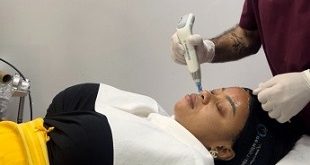
‘Not based on scientific evidence’
Inhaling steam is a traditional remedy used by some communities to treat colds, but there is little evidence that it is effective.
“This claim is not based on scientific evidence. WHO hasn’t received data from clinical trials which can support such a claim,” WHO Africa spokesman Collins Boakye-Agyemang told AFP Fact Check.
More broadly speaking, the UN health agency has refuted claims that heat can prevent or treat Covid-19. This includes hot baths, hand dryers, living in humid climates, and sunny weather.
A 2017 study in the Cochrane Database of Systematic Reviews found that there is no conclusive evidence that steam reduces cold symptoms or the viral dose of the rhinovirus that causes colds. When disinfecting a surface, applying heat can destroy coronavirus particles, but similar treatments are not effective once the virus is already inside the human body.
Eucalyptus, also known as gumtree, is popular for its oil and leaves. Guava leaves are also used in folk medicine in several countries, mainly as an anti-diarrheal remedy. However, there is not sufficient scientific evidence that this is an effective treatment.
The leaves of mhlonyane, a common plant in Southern Africa, have been used by traditional healers for centuries to manage respiratory diseases. Although the herb can be effective in treating bacteria, no evidence has been found to show that it kills viruses like COVID-19, according to Sandy van Vuuren, a professor at Wits University in South Africa.
What does steaming do?
When blood vessels along the lining of the nasal passages, tract, and sinuses become irritated and inflamed during an infection, they secrete mucus causing congestion. Inhaling steam, lubricates the lining and dilutes the mucus, allowing it to empty more easily and creating temporary relief in breathing. The warm steam can also ease irritation and inflammation.
The safe way to do it at home would be to do it in isolation, in a ventilated room, with a towel or blanket over one’s head, while inhaling the steam rising from hot water, placed in a large bowl. The person’s head should ideally be about 12 inches away from the water, and slow deep breaths should be taken for about two to five minutes.
However, steaming carries a high risk of scalding, or burning, of both skin and airways, when done improperly or incorrectly.
There have been numerous reports of such instances, including in young children.
Covid symptoms present in a multitude of ways and combinations, including fever, body pain, diarrhoea, runny nose, stuffy nose, and more. Steaming is helpful when presented symptoms are similar to that of a common cold, causing a stuffy nose and sinusitis.
It is incapable of preventing infection. It is also not capable of killing or destroying the virus or preventing its replication, as many sources have wrongly claimed.
Additionally, any respiratory or breathing distress itself cannot be relieved by steaming. The breathing distress is caused by the disease, while congestion and cold-like stuffy nose are only symptoms that can be alleviated through steam inhalation.
Steam inhalation without congestion could worsen other respiratory conditions like asthma. Use of essential oils in steam could also potentially lead to seizures.
So exercise caution while opting for steam therapy. It’s definitely not the cure all that it is at times made out to be, say the experts.
****
 The Independent Uganda: You get the Truth we Pay the Price
The Independent Uganda: You get the Truth we Pay the Price




Second wave is brutal, yet water has been going off in Kampala for periods of 3 days, 5 days, 6 days.
Many people are going to get sick because of no water.
We are kindly requesting gavumenti to ensure that we have water in Kampala during this second wave, even if it means temporarily pausing road repairs or whatever it is that is causing us to have no water during this second wave when we really need clean running water to stay safe.
If we follow the required SOPs related to prevention we shall survive. But more talk of no water, no this and that will chase away the disease. Let us step up by first washing our hands at every entry point in the public observe social distance and remind every body to put on a face mask. Have at least four face masks for every event be it the market, the shop and on the road. Carry a sanitizer even if it means soapy water in a mineral bottle water and don’t get close to one another with out cross checking any signs of infection which is always read out by the Ministry of Health